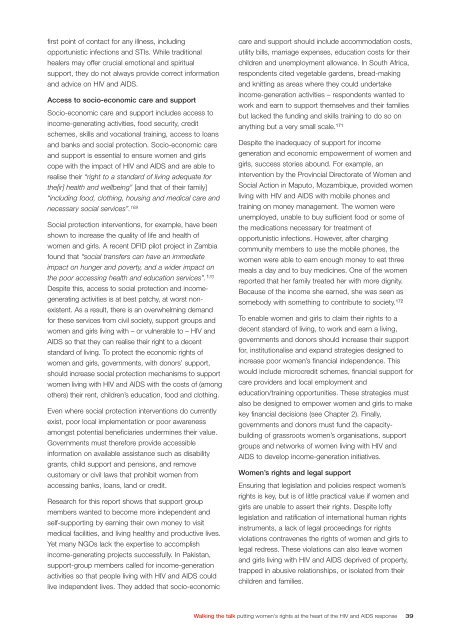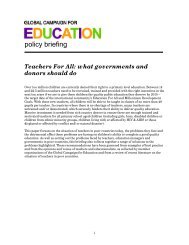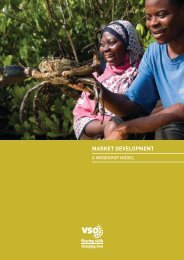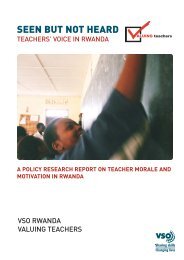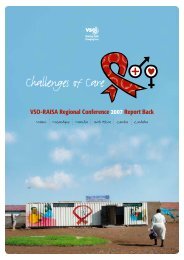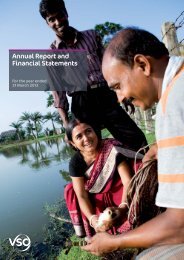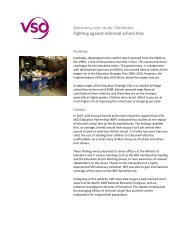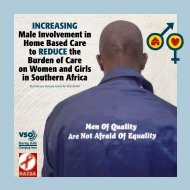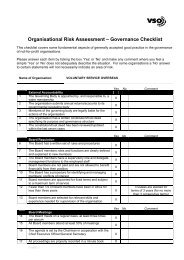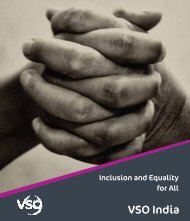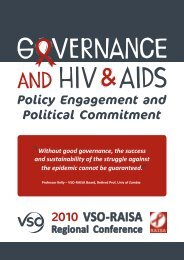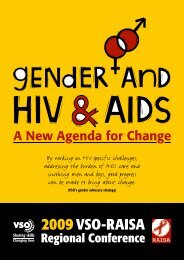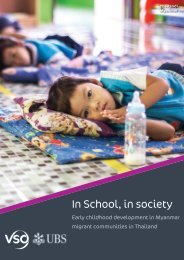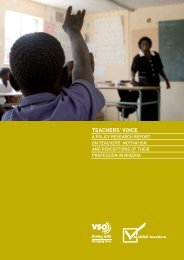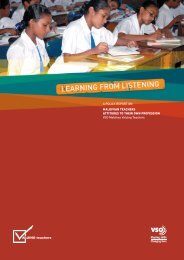Walking the Talk - VSO
Walking the Talk - VSO
Walking the Talk - VSO
Create successful ePaper yourself
Turn your PDF publications into a flip-book with our unique Google optimized e-Paper software.
first point of contact for any illness, includingopportunistic infections and STIs. While traditionalhealers may offer crucial emotional and spiritualsupport, <strong>the</strong>y do not always provide correct informationand advice on HIV and AIDS.Access to socio-economic care and supportSocio-economic care and support includes access toincome-generating activities, food security, creditschemes, skills and vocational training, access to loansand banks and social protection. Socio-economic careand support is essential to ensure women and girlscope with <strong>the</strong> impact of HIV and AIDS and are able torealise <strong>the</strong>ir “right to a standard of living adequate for<strong>the</strong>[ir] health and wellbeing” [and that of <strong>the</strong>ir family]“including food, clothing, housing and medical care andnecessary social services”. 169Social protection interventions, for example, have beenshown to increase <strong>the</strong> quality of life and health ofwomen and girls. A recent DFID pilot project in Zambiafound that “social transfers can have an immediateimpact on hunger and poverty, and a wider impact on<strong>the</strong> poor accessing health and education services”. 170Despite this, access to social protection and incomegeneratingactivities is at best patchy, at worst nonexistent.As a result, <strong>the</strong>re is an overwhelming demandfor <strong>the</strong>se services from civil society, support groups andwomen and girls living with – or vulnerable to – HIV andAIDS so that <strong>the</strong>y can realise <strong>the</strong>ir right to a decentstandard of living. To protect <strong>the</strong> economic rights ofwomen and girls, governments, with donors’ support,should increase social protection mechanisms to supportwomen living with HIV and AIDS with <strong>the</strong> costs of (amongo<strong>the</strong>rs) <strong>the</strong>ir rent, children’s education, food and clothing.Even where social protection interventions do currentlyexist, poor local implementation or poor awarenessamongst potential beneficiaries undermines <strong>the</strong>ir value.Governments must <strong>the</strong>refore provide accessibleinformation on available assistance such as disabilitygrants, child support and pensions, and removecustomary or civil laws that prohibit women fromaccessing banks, loans, land or credit.Research for this report shows that support groupmembers wanted to become more independent andself-supporting by earning <strong>the</strong>ir own money to visitmedical facilities, and living healthy and productive lives.Yet many NGOs lack <strong>the</strong> expertise to accomplishincome-generating projects successfully. In Pakistan,support-group members called for income-generationactivities so that people living with HIV and AIDS couldlive independent lives. They added that socio-economiccare and support should include accommodation costs,utility bills, marriage expenses, education costs for <strong>the</strong>irchildren and unemployment allowance. In South Africa,respondents cited vegetable gardens, bread-makingand knitting as areas where <strong>the</strong>y could undertakeincome-generation activities – respondents wanted towork and earn to support <strong>the</strong>mselves and <strong>the</strong>ir familiesbut lacked <strong>the</strong> funding and skills training to do so onanything but a very small scale. 171Despite <strong>the</strong> inadequacy of support for incomegeneration and economic empowerment of women andgirls, success stories abound. For example, anintervention by <strong>the</strong> Provincial Directorate of Women andSocial Action in Maputo, Mozambique, provided womenliving with HIV and AIDS with mobile phones andtraining on money management. The women wereunemployed, unable to buy sufficient food or some of<strong>the</strong> medications necessary for treatment ofopportunistic infections. However, after chargingcommunity members to use <strong>the</strong> mobile phones, <strong>the</strong>women were able to earn enough money to eat threemeals a day and to buy medicines. One of <strong>the</strong> womenreported that her family treated her with more dignity.Because of <strong>the</strong> income she earned, she was seen assomebody with something to contribute to society. 172To enable women and girls to claim <strong>the</strong>ir rights to adecent standard of living, to work and earn a living,governments and donors should increase <strong>the</strong>ir supportfor, institutionalise and expand strategies designed toincrease poor women’s financial independence. Thiswould include microcredit schemes, financial support forcare providers and local employment andeducation/training opportunities. These strategies mustalso be designed to empower women and girls to makekey financial decisions (see Chapter 2). Finally,governments and donors must fund <strong>the</strong> capacitybuildingof grassroots women’s organisations, supportgroups and networks of women living with HIV andAIDS to develop income-generation initiatives.Women’s rights and legal supportEnsuring that legislation and policies respect women’srights is key, but is of little practical value if women andgirls are unable to assert <strong>the</strong>ir rights. Despite loftylegislation and ratification of international human rightsinstruments, a lack of legal proceedings for rightsviolations contravenes <strong>the</strong> rights of women and girls tolegal redress. These violations can also leave womenand girls living with HIV and AIDS deprived of property,trapped in abusive relationships, or isolated from <strong>the</strong>irchildren and families.<strong>Walking</strong> <strong>the</strong> talk putting women's rights at <strong>the</strong> heart of <strong>the</strong> HIV and AIDS response 39


